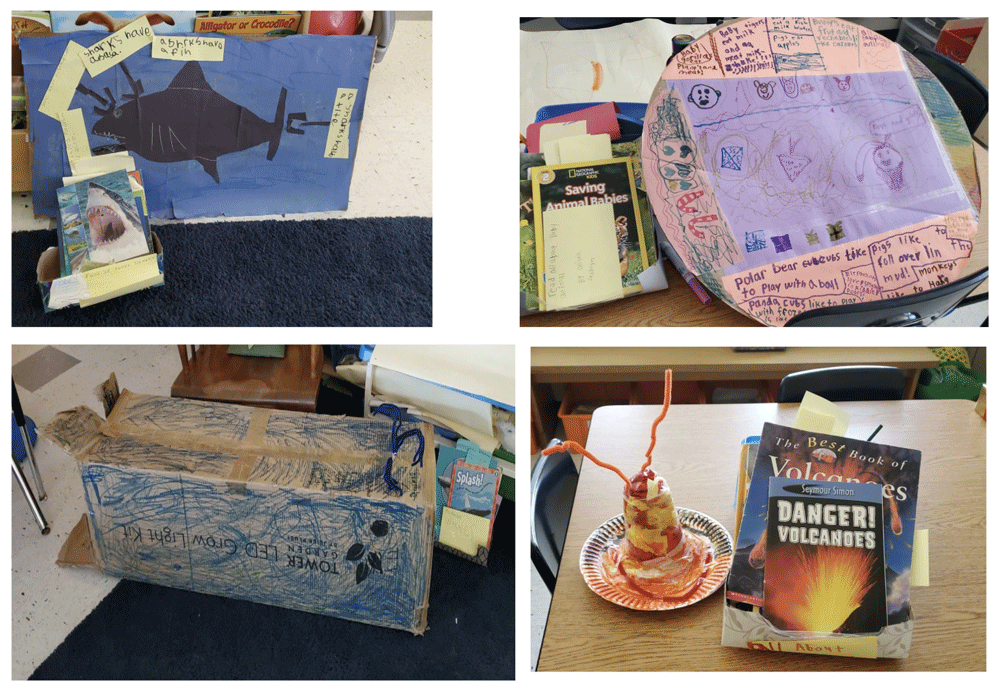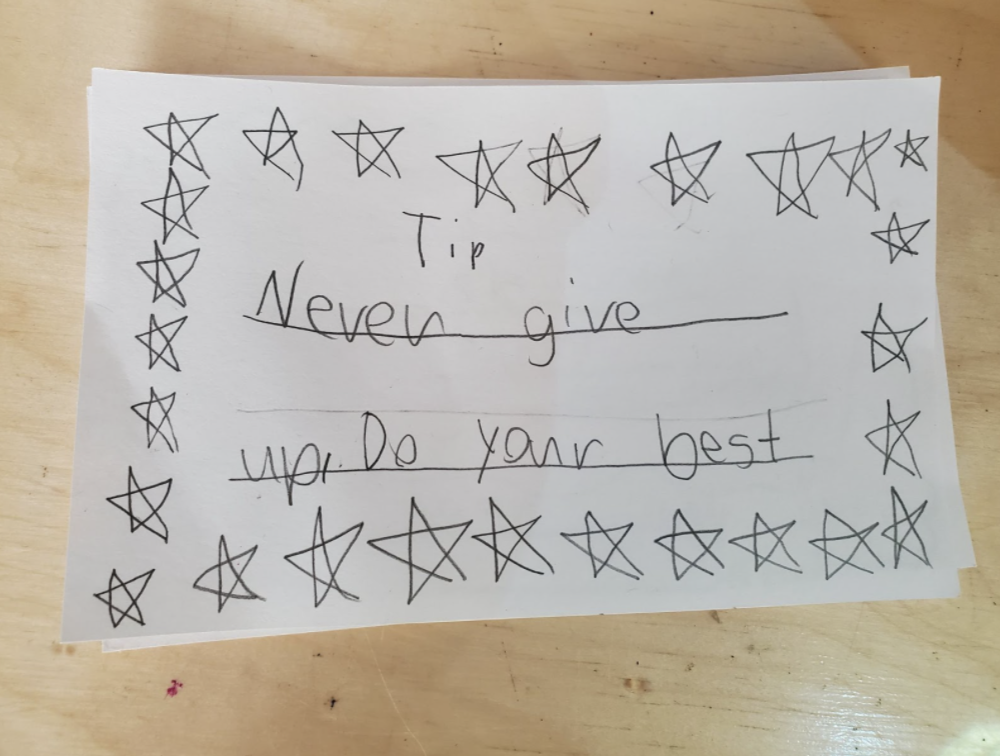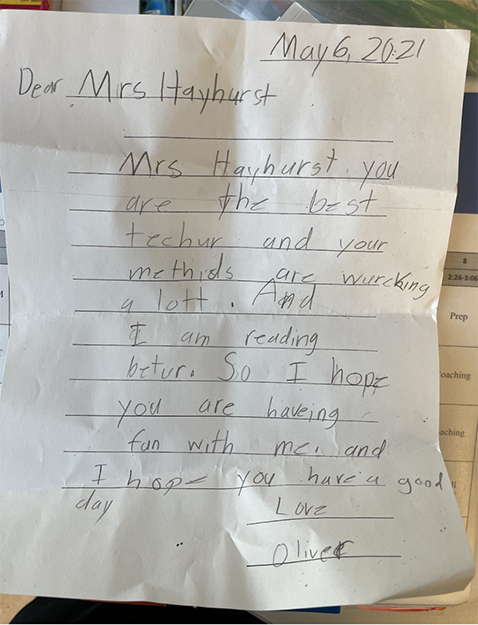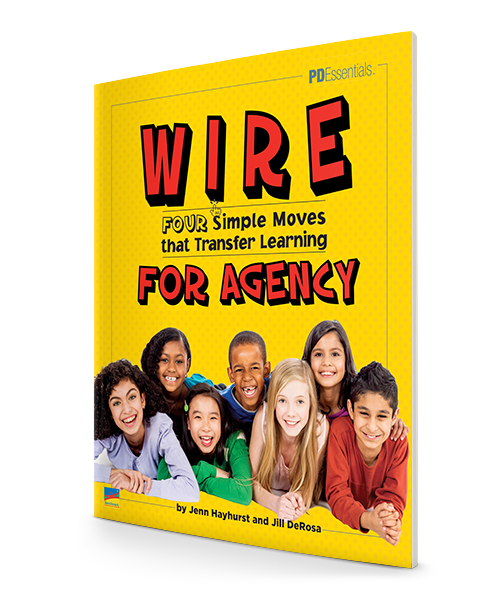- Benchmark Education
- Newmark Learning
- Reycraft Books
- Create an Account
Agency: From Start to Finish

by Jenn Hayhurst and Jill DeRosa
School’s out for summer! Our last day was June 26, and now that we have dipped our toes in the first days of break, we can take a breath and reflect. Thinking back on this school year, Captain Obvious would say it came with many challenges. That would be an understatement; there was an abundance of change and much of it made school strange and even scary. Masked children tucked away behind plexiglass barriers sitting isolated in their rows was unlike anything we have ever experienced before. As we say good-bye to the 2020-2021 school year, there are two overwhelming feelings: relief and gravity. We say the word “relief” with a pang in our teacher hearts; but we are being honest, and this was a really hard year. Never in our lives did we think we would have to quarantine books, and that turn and talk would be shunned. We say the word “gravity” because we have just undergone the biggest educational shift ever. While it is human nature to want to rush back to normal, now is the time to resist that urge and ask the questions: What have we learned? What new practices will we keep?
We have learned (or at least reaffirmed) that our students are resilient and determined when it comes to wanting to have a hand in their own learning. For many, the desire to engage in meaningful work, to get the things they need for success, and to make an impact (to go beyond themselves) has been a bright spot this year. We have seen our students take on leadership roles like never before, despite the many restrictions imposed on them. As a result, here are some practices that we will be keeping:
-
Students teaching each other using NearPods
-
Students writing letters about timely causes such as mask mandates
-
Amplifying students’ voices by creating multimodal texts as a way of self-expression
-
Working collaboratively to test technology to find the perfect platform for a specific need
-
Brainstorming creative ways to connect with their peers and others around their ideas
In the face of great adversity, agency showed up. Even this year, one that was ushered in by trauma and fear, agency took root and grew when we made the choice to trust our students and ourselves. Meaningful learning overcomes the steepest obstacles when we learn with a sense of agency. For us, this was the best and most powerful reflection we have been able to uncover so far.
What Is Agency?
In our book, W I R E for Agency: Four Simple Moves That Transfer Learning, we describe agency as a belief system that says your actions can and will make an impact. Working with a sense of agency means learning happens on its own accord because of personal conviction that the work matters. People with a sense of agency believe they have the power to make a difference in the world. Taking an agentive stance for teaching and learning shifts control from compliance (working for praise) to taking ownership (driven by personal belief). Promoting agency in school is predicated on three instructional constructs: access, language, and choice.
Agency: It Matters for All of Us
The first and most powerful lesson we can teach our students is that their voices matter. They need to be active participants in their education. When students take that first step, to speak up and share what they think, our next move is critical—now is the time to make room for what they have to say. Teachers who are flexible and responsive are able to draw from a depth of knowledge for child development and curriculum goals. All of this is in pursuit of the answer to these questions: Who are my students? How do they see themselves in the world? Who do they aspire to be?
Agency Honors Identity
Identity work stems from tailoring classroom experiences for all students. Classrooms that are designed to bolster students' emerging identities over time help students become who they are each and every day. We believe that bearing witness to this requires a great deal of care on our part. In the book Mindsets and Moves (2005), Dr. Gravity Goldberg coined the phrase "an admiring lens": “This (an admiring lens) means we approach readers as admirers, with a few beliefs in mind: all students are worthy of study and to be regarded with wonder. All students are readers, yet their processes may look different. All students can learn to make purposeful choices about their reading. All students can develop ownership of their reading lives.” This is true not only for developing readers, but also for developing humans.
Knowing students and what they value comes from watching them with the intention to learn all about them: their interests, strengths, challenges, social interests, emotions, traditions, and beliefs about themselves. How do they see themselves and their place in the world? In answering this question, there is an opportunity to set up environments that lead to self-discovery. When children know who they are as learners and what they need to be successful, they have a license to work with a sense of agency. When teachers provide these openings, they are taking agency to bend the curriculum to meet our students' needs. It’s not to just inform our next moves; it informs their next moves. We come together with both perspectives to further “self” and intentional work.
Agency Grows Self-Efficacy
Agency and identity are linked through belief. What we believe to be true about ourselves directs our beliefs about our role, and impact, in the world. Peter Afflerbach writes, “Self-efficacy refers to one’s perceived capabilities for learning or performing actions at designated levels; agency is the belief that one can exert a large degree of control over important events in one’s life; and volition refers to the belief that one can successfully implement strategies to attain important goals. As applied to reading, students’ motivation is apt to be higher when they believe that they are capable of performing well, can control their success in reading, and can implement strategies that help keep them engaged.”
If we believe in ourselves, then we have everything we need to be successful. This rings true for teachers and students. We are models of both self-reliance and collaborative spirit. We can teach students how to work in these capacities while responding to them in ways that build up their competence and confidence. Feeling capable and functioning as an independent thinker who is open-minded to others’ perspectives is the goal. The point is to be generous with our assessments of students and all they can accomplish, but it is essential to believe in their assets. If you believe in them, they will believe in you, and together anything is possible.
Agency Means Ownership Over Learning
There are very specific, concrete expectations that come with schooling. Students (and their families) come through the doors with preconceived expectations. They know they are coming to learn how to read, to write, and to problem solve mathematical equations. They come to our classrooms looking for friendships and connections. We are inviting you to pause and reflect on what the role of a teacher could be if we all made a choice to share control with students. Sharing control with students involves an investment of time for decision making that will be actionable. It means not everyone will produce the same product, and that is better than OK. It’s better than OK because that means by the end of the process, each child will have something unique to share that is a reflection of themselves. Costa and Kallick said it best: “We foster our own growth when we control our learning, so some reflection is best done alone. Reflection is also enhanced, however, when we ponder our learning with others.”
Providing real opportunities for ownership and agentive learning is managed by offering students access to what they need, whether what they need is access to specific materials, or additional support through collaborative work. Access is key. The language we use with students is just as important. We can be the voice in their ears to promote a growth mindset. Teach them how to work past their struggle and the end product will be greater than any score on a rubric. Now they are learning how to use productive language to keep striving toward a better outcome for themselves. Put the power in their hands through choice. Choice in what or how to present their learning is the best way to direct their learning. They are not all going to learn about sharks; instead they are going to learn about topics that interest them AND we are still going to meet the needs of curriculum or standards. When we give ourselves permission to take ownership over our teaching within this same frame, we will begin to leave self-doubt and the need to conform behind as well.

Access Looks Like Autonomy
Students get what they need when they need it (independently or with support) and are also given access to the time needed to think.
-
Materials - giving students what they need to be successful and making sure it is within their reach
-
Classroom Experiences- all students get to experience all that the classroom has to offer, whether it is the library, technology, or wonder space
-
Time - giving students time to unpack their learning in ways that are meaningful to them and to make their plan for how they will accomplish this
-
Working with Others - giving students openings to work with us as their teachers, or their peers in partnerships or small groups
-
Independent Work - allowing students to decide when they need to separate and work on their own in a spot in a classroom that is conducive to their learning style
Language Sounds Like Support
Language is used as a vehicle to foster safety, empathy, equity, and trust between teachers and learners.
-
Can you give your classmate a tip to help them solve their challenge?
-
What can you do to help yourself?
-
What do you want to do next?
-
Begin feedback with the word “you” and not “I”—the feedback is student-centric. “You did… and then you… what has this taught you so far?”
-
How can you do this in a different way?
-
What did you learn from this mistake? How can that help you in the future?
-
What do you think you did well? What do you want to work on? Why?
Choice Feels Like Freedom
Learners are given choices in terms of deciding content, how they approach a task, strategies to use, with whom they work, and so on.
-
Self-selected topics - you are not assigned a topic; instead everyone selects their own
-
Self-selected partnerships - you can work with whom you choose
-
Self-selected book choice - libraries are open for you to pick books that you are excited about
-
Self-selected modes of writing - you choose the mode that best expresses your ideas
-
Self-selected demonstration of learning in terms of a product - you decide the way you will show what you learned
-
Self-selected supplies - you choose what supplies work best for you
-
Self-selected resources - you can use the things you need
-
Self-selected strategies - you choose strategies that help you be successful
Agency: It’s Closer Than You Think
Agency already exists in every classroom whether we know it or not. When you see students learning as the reward itself, that is agency. Every time we lean into the curriculum, there is the possibility that we will hit upon something that taps into a student’s sense of agency. It can be a topic or a character they feel connected to, and then all of a sudden we notice a boost in their learning. We might not realize this is agency because it was not intentional. We are suggesting, what if it were? What if we offered learning that was truly meaningful to our kids? School would become a place of acceptance and self-discovery. There have been so many challenges this year, but maybe the solution for those challenges was always within our reach. Make a choice for agency, and tap into the power we all possess.
What's Next?
Join authors Jenn Hayhurst and Jill DeRosa for a free PD webinar, Agency for All: Transformative Practices That Empower Students (and Teachers Too!), now available on demand. What is agency and how does it motivate joyful learning? Explore a framework for developing agency through responsive teaching and a student-centered approach. Watch now!
About the Authors
 |
Jenn Hayhurst is a creator and co-moderator of the influential weekly Twitter chat #G2Great with Mary Howard and Amy Brennan. She is a literacy coach with a focus on Grades K-3 and has worked as an Adjunct Professor for graduate students completing their practicum at Long Island University, Riverhead. Jenn is the co-author of W I R E for Agency: Four Simple Moves That Transfer Learning. |
|
|
Jill DeRosa is a second grade teacher and a district lead teacher charged with providing professional development for her colleagues. She is also an Adjunct Professor at Long Island University, where she teaches preservice teachers. Jill has taught in both private and public school, with a focus in Grades K-3. Jill is the co-author of W I R E for Agency: Four Simple Moves That Transfer Learning. |
You May Like: W I R E for Agency: Four Simple Moves That Transfer Learning
















Comments